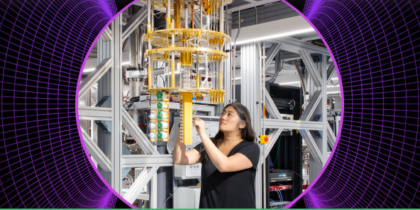Here’s the deal: classical computers rely on bits to measure processing capability and power but the arrival of quantum computers has completely obliterated traditional PC performance. So much so that security experts are worried that in the wrong hands, they could mean the end of encrypted communications and internet as we know it. Surely these things can’t be cheap?
Power doesn’t come cheap. And for now, quantum computers are out of the reach of the mass market.
Quantum vs Classical computing
Before we get to how much these things cost, let’s talk about the power difference between the two.
That laptop or PC you’re using has either a 32-bit or 64-bit processor. It can handle data in the form of 1s and 0s only.
A 32-bit CPU can handle 34,359,738,368 bits at once. A 64-bit processor holds double the number of bits than that.
With us so far? Good. Because here is where it gets more complex.
Quantum computers rely on qubits. A qubit can be both or either 1 and 0 at any time. In simpler terms, It exists in both states or even one of them – a total of four states. This basically translates to an exponential increase in power than traditional bits.
Fact: A 100 Qubit quantum computer is more powerful than all the supercomputers on Earth combined.

How much do quantum computers cost?
Now for the burning question – how much do these darn things cost?
- Commercial quantum computers like D-Wave One with 50 qubits – $10,000,000.
- D-Wave’s 2000 qubit quantum computer – $15 million.
- For every extra qubit in processing power – $10,000.
- SpinQ’s portable quantum computer with 2 qubits – $5,000.
It is interesting how these computers do their quantum processing calculations. SpinQ’s ‘cheap’ model, which is aimed at schools, relies on magnetic resonance for limited problem-solving capabilities. In comparison, D-Wave’s 2000Q model employs a topographical map to solve problems.
Given these examples, researchers agree that the ‘true state quantum computer’ is yet to happen. These computers need to achieve zero errors and maximum stability, a far cry from existing quantum computers. Nevertheless, this is a only matter of when. These new machines will end up costing billions, and will become a reality after a decade.
Currently, IBM has the fastest quantum computer with 127 qubit processing capability.
Who wants to pay for quantum computing?
Over the years, there has been billions poured into the research and development of quantum computers by private and public entities.
These industries stand to benefit the most with problem-specific quantum computing capabilities:
- Pharma
- Chemical
- Manufacturing
- Defense
- Logistics
The problems they have can’t be solved by applications in use today. But the processing power and complex problem-solving capabilities possessed by quantum computers can.
How much energy do you need to run a quantum computer?
Turns out that quantum computers are resource-hungry. They need proper cooling on top of the energy to run efficiently.
It is estimated that a quantum computer that consumes 25 kilowatt per year will require $25,000 per unit to run in the US! Its hard not to see corporations paying millions of dollars into just keeping their quantum rigs cool and running.
The D-Wave model relies on -460 degrees Fahrenheit to keep running in a stable form.
Types of Quantum Computers
In 2023, various types of quantum computers will be in development and production, categorized based on the qubit technology they employ. Presently, there are five prominent qubit methodologies:
- SUPERCONDUCTING
The most prevalent quantum computers use superconducting qubits. These devices employ tiny electrical circuits and manipulate qubits, often crafted from superconducting materials.
Leading companies in this field include Google, Microsoft, Rigetti Computing, Quantum Circuits, Inc., IBM, and IQM.
Image description: Adiabatic quantum processor chip mounted in cryogenic chip carrier and ready to use.
- TRAPPED IONS
Another popular approach utilizes ion-trap quantum computers. These systems employ ions, atoms or molecules with a net electric charge, confined and managed using electric and magnetic fields to store and process quantum information.
Companies advancing in this area include Quantinuum, ionQ, Alpine Quantum Technologies, and eleQtron.
- PHOTONIC
Photonic quantum computers, another significant approach, harness photons (particles of light) for carrying and processing quantum information.
Commercial entities embracing this qubit technology include PsiQuantum, Xanadu, and ORCA Computing.
- NEUTRAL ATOMS
Quantum computing with neutral atoms involves utilizing neutral atoms suspended in a high vacuum through arrays of precisely focused laser beams known as optical tweezers. These arrays have been scaled to accommodate over 100 alkali atoms.
Commercial players in this include ColdQuanta, QuEra, and Pasqal.
- QUANTUM DOTS
Quantum dot quantum computing employs qubits composed of pairs of quantum dots, specifically silicon qubits, making them valuable for various applications, including quantum computing.
Companies invested in this approach include Diraq, Intel, and Quantum Motion.
- OTHER QUBIT MODALITIES
Additional approaches include utilizing electrons on helium, quantum computers integrating silicon CMOS, and nitrogen-vacancy centers (N-V centers).
It’s important to note that each type of quantum computer has its own distinct strengths and weaknesses, and their suitability varies depending on the specific problems they are designed to address.
Emerging Competition in Quantum Computing
As of September 7, 2023, quantum computing has witnessed several recent breakthroughs.
- In June 2023, IBM unveiled a significant achievement, demonstrating that IBM quantum computers can generate precise results on a scale exceeding 100 qubits. This surpasses the capabilities of leading classical computing approaches.
This development marks a significant milestone, affirming that today’s quantum computers are robust scientific instruments capable of modeling exceptionally complex problems, some of which may be impossible for classical systems. It signifies the dawn of a new era in quantum computing utility.
- On the other hand, Google has introduced its latest quantum machine, the Sycamore quantum processor, which presently boasts 70 qubits.
- Additionally, IBM quantum computer is poised to introduce Condor in 2023, heralded as the world’s first universal quantum computer, featuring over 1,000 qubits. These advancements propel quantum computing into uncharted territories of computational power and problem-solving capability.
Are Quantum Computers and Supercomputers the same?
Quantum computers and supercomputers represent two advanced computing systems. They have distinct characteristics:
Can Quantum computers be monitored for standards?
The International Organization for Standardization (ISO) has introduced its first-ever set of standards for Quantum Key Distribution (QKD) security requirements. These standards provide a comprehensive framework to assess the security of QKD systems, covering various aspects of QKD modules and protocols.
The standards, recognized as a significant advancement in quantum encryption, will usher in a new era of secure data transmission. ISO’s document establishes fundamental security requirements for QKD modules, addressing security challenges and categorizing QKD protocols.
The security requirements for conventional network components in QKD modules are integrated into the wider ISO/IEC 15408 framework. ISO, a global organization with 169 member countries, focuses on creating international standards to tackle global challenges and promote innovation.
These QKD security standards demonstrate ISO’s dedication to enhancing cybersecurity. They will play a crucial role in ensuring the security of quantum communication systems, contributing to a more secure and resilient digital future.
How long would it take for Quantum Computers to be in the market?
QuEra Computing, the creator of the world’s first publicly accessible neutral-atom quantum computer, Aquila, has extended its availability on Amazon Braket. You can now access Aquila for 48 hours a week instead of 10, responding to high demand and accommodating people from various time zones worldwide.
QuEra Computing’s CEO, Alex Keesling, expressed enthusiasm for this expansion, emphasizing the strong interest from the quantum computing community. With its 256 qubits and long qubit lifetimes, Aquila has attracted many to explore quantum computing projects on Amazon Braket.
Amazon Braket’s General Manager, Richard Moulds, highlighted the importance of choice in quantum hardware and how this expanded availability offers you more opportunities for longer and more complex quantum computing tasks. Aquila, as the first publicly accessible neutral-atom quantum computer, brings unique capabilities to you across industries.
Next in line: Alliance is the Key
Quantum companies and startups are quickly attracting experienced advisors and board members despite the unproven nature of the industry.
This week, several quantum companies, including Atom Computing, Oxford Ionics, and Qrypt, welcomed new board members and advisors from diverse leadership backgrounds.
Atom Computing added Ken Braithwaite, former Secretary of the Navy, to its board of directors. Greg Muhlner joined as vice president of the public sector to lead U.S. government engagement. Atom Computing’s CEO, Rob Hays, highlighted the significance of government involvement in quantum computing.
Qrypt appointed Christopher Moretti, VP of global technology and cloud transformation at Evernorth Health Services, and previously brought on Ken Dixon, a longtime Verizon leader, to its board of advisors. Moretti emphasized the importance of emerging technologies like quantum in data security.
Oxford Ionics appointed Dipesh Patel, former CTO of ARM, as a non-executive director. This move followed a £2 million fundraise for strategic technologies in partnership with Infineon Technologies.
These additions signify the growing interest and investment in the quantum industry and its potential impact on various sectors.



